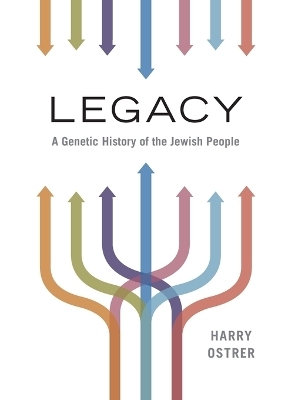
Legacy
A Genetic History of the Jewish People
Seiten
2012
Oxford University Press Inc (Verlag)
978-0-19-537961-7 (ISBN)
Oxford University Press Inc (Verlag)
978-0-19-537961-7 (ISBN)
Who are the Jews--a race, a people, a religious group? For over a century, non-Jews and Jews alike have tried to identify who they were--first applying the methods of physical anthropology and more recently of population genetics.
In Legacy, Harry Ostrer, a medical geneticist and authority on the genetics of the Jewish people, explores not only the history of these efforts, but also the insights that genetics has provided about the histories of contemporary Jewish people. Much of the book is told through the lives of scientific pioneers. We meet Russian immigrant Maurice Fishberg; Australian Joseph Jacobs, the leading Jewish anthropologist in fin-de-siècle Europe; Chaim Sheba, a colorful Israeli geneticist and surgeon general of the Israeli Army; and Arthur Mourant, one of the foremost cataloguers of blood groups in the 20th century. As Ostrer describes their work and the work of others, he shows that to look over the genetics of Jewish groups, and to see the history of the Diaspora woven there, is truly a marvel. Here is what happened as the Jews migrated to new places and saw their numbers wax and wane, as they gained and lost adherents and thrived or were buffeted by famine, disease, wars, and persecution. Many of these groups--from North Africa, the Middle East, India--are little-known, and by telling their stories, Ostrer brings them to the forefront at a time when assimilation is literally changing the face of world Jewry.
A fascinating blend of history, science, and biography, Legacy offers readers an entirely fresh perspective on the Jewish people and their history. It is as well a cutting-edge portrait of population genetics, a field which may soon take its place as a pillar of group identity alongside shared spirituality, shared social values, and a shared cultural legacy.
In Legacy, Harry Ostrer, a medical geneticist and authority on the genetics of the Jewish people, explores not only the history of these efforts, but also the insights that genetics has provided about the histories of contemporary Jewish people. Much of the book is told through the lives of scientific pioneers. We meet Russian immigrant Maurice Fishberg; Australian Joseph Jacobs, the leading Jewish anthropologist in fin-de-siècle Europe; Chaim Sheba, a colorful Israeli geneticist and surgeon general of the Israeli Army; and Arthur Mourant, one of the foremost cataloguers of blood groups in the 20th century. As Ostrer describes their work and the work of others, he shows that to look over the genetics of Jewish groups, and to see the history of the Diaspora woven there, is truly a marvel. Here is what happened as the Jews migrated to new places and saw their numbers wax and wane, as they gained and lost adherents and thrived or were buffeted by famine, disease, wars, and persecution. Many of these groups--from North Africa, the Middle East, India--are little-known, and by telling their stories, Ostrer brings them to the forefront at a time when assimilation is literally changing the face of world Jewry.
A fascinating blend of history, science, and biography, Legacy offers readers an entirely fresh perspective on the Jewish people and their history. It is as well a cutting-edge portrait of population genetics, a field which may soon take its place as a pillar of group identity alongside shared spirituality, shared social values, and a shared cultural legacy.
Harry Ostrer, MD is Professor of Pathology and Genetics at Albert Einstein College of Medicine and Director of Genetic and Genomic Laboratories at Montefiore Medical Center. In October 2010, he was named to the Forward 50 list of "people who have made an imprint in the past year on the ways in which American Jews view the world and relate to each other."
Chapter 1: Looking Jewish ; Chapter 2: Founders ; Chapter 3: Genealogies ; Chapter 4: Tribes ; Chapter 5: Traits ; Chapter 6: Identity ; References
| Erscheint lt. Verlag | 17.5.2012 |
|---|---|
| Zusatzinfo | 60 illustrations |
| Verlagsort | New York |
| Sprache | englisch |
| Maße | 140 x 211 mm |
| Gewicht | 431 g |
| Themenwelt | Studium ► 2. Studienabschnitt (Klinik) ► Humangenetik |
| Sozialwissenschaften ► Ethnologie | |
| Sozialwissenschaften ► Soziologie ► Spezielle Soziologien | |
| ISBN-10 | 0-19-537961-6 / 0195379616 |
| ISBN-13 | 978-0-19-537961-7 / 9780195379617 |
| Zustand | Neuware |
| Informationen gemäß Produktsicherheitsverordnung (GPSR) | |
| Haben Sie eine Frage zum Produkt? |
Mehr entdecken
aus dem Bereich
aus dem Bereich
Schulbuch Klassen 7/8 (G9)
Buch | Hardcover (2015)
Klett (Verlag)
31,50 €
Buch | Softcover (2004)
Cornelsen Verlag
25,99 €



